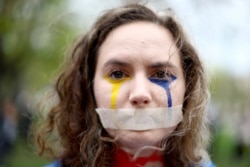On May 5, Chinese state-affiliated media outlet T-House retweeted a cartoon from the Chinese Communist Party (CCP) mouthpiece, Global Times.
Uncle Sam, a stand-in for the United States, is shown stabbing “Europe” in the back. “U.S. always stands with its allies,” the caption says.
Capital flight, energy shortage, refugees, and food crisis are written on the four knives in “Europe’s” back. To the right, a sign reads “Ukraine crisis.”
T-House adds its own sarcasm: “A good friend will always have your back.”
In sum, the message is this: The United States is to blame for the catastrophic events in Europe stemming from Russia’s war on Ukraine.
That is false, but also symptomatic of the way Chinese disinformation has tried to exploit the war with a steady diet of false and misleading reporting that demonizes the United States and its Western allies.
China has consistently refused to criticize Russia for its actions in Ukraine. Prior to Russia’s invasion in February, China attacked the United States for “playing up the threat of war” while the Kremlin lied about its plans.
Once Russia actually invaded, China still did not call the war a war. Chinese state media mostly continue to call it a “situation,” “crisis” or “conflict,” following the lead of Moscow, which criminalized calling it a war.
Similarly, Chinese officials continue to repeat the falsehood that the United States promised Russia it would never expand the North Atlantic Treaty Organization eastward into former Soviet states or satellite countries.
A Chinese foreign policy spokesperson recently said the United States bears “unshirkable responsibility for the outbreak of the Ukraine crisis.”
In other words, China has not held Russia responsible for the obvious fact that it launched a full-scale attack on Ukraine, expanding a conflict the Kremlin started in 2014 by annexing Crimea and instigating a separatist conflict.
Regarding the consequences of capital flight, energy shortage, refugees and food crises, Chinese state media reports rarely examine those problems within the context of Russia’s illegal invasion.
For example, an article from China’s Xinhua news agency argued that “the entire European continent is bearing the brunt of the crisis,” which it again calls a “conflict,” not a war.
That Xinhua report noted rising global energy prices, threats to energy security and “a looming drop in the standard of living in many parts of Europe,” which has been dependent on Russian oil and gas supplies.
Xinhua blamed U.S. and Western economic sanctions for “wreaking more havoc in Europe.” The story used the term “Russia-Ukraine conflict,” failing to distinguish between Ukraine as the attacked party and Russia as the aggressor.
The systematic lack of context brings a surreal tone to China’s war reporting, which often describes the consequences of attacks without ever saying which side carried them out, or even mentioning who is fighting.
In a report on Russia’s airstrike against a Mariupol theater, which The Associated Press said may have killed 600 people, a Russian-speaking correspondent on China’s CGTN TV questioned whether the attack had been "a notorious provocation.”
CGTN’s English subtitles did not translate the phrase "notorious provocation.”
Reporting on the Ukraine refugee crisis has been similar. The United Nations said the invasion set off a “grave humanitarian crisis,” creating an estimated 5.6 million refugees and 7.7 million internally displaced people.
A CGTN report posted to YouTube on February 25 included interviews with refugees who were “happy to come to Russia” with no mention of why they left Ukraine.
Another CGTN report noted that tens of thousands of people were fleeing Ukraine every day, again without mentioning why.
Yet another video, overdubbed with folksy music, noted that people were leaving because of “conflict in Ukraine,” but didn’t say that Russia invaded.
One CGTN video that used the word “war” in the video description implied that Ukraine is to blame: “With the Ukrainian government's decision to extend the ‘state of war’ until the end of April, displaced people remain content with living simply.”
Chinese media give the so-called “energy shortage” similar biased treatment.
In March, the White House signed an executive order banning the import of Russian oil, liquefied natural gas and coal to the United States.
The European Union said on May 4 that it also may ban Russian oil, which National Public Radio called “a uniquely prickly problem for Europe.”
Russia is the top provider for the EU’s energy needs. ABC reported that European Union countries import 40 percent of their gas and 25 percent of their oil from Russia, with energy independence years off.
Meantime, about 40 percent of Russia’s budget is from oil and gas, and it finances the war while softening the blow of Western sanctions.
Chinese state media reports focus on sanctions or cite experts who say the European Union is bearing the “backlash of sanctioning Russia.” Omitted is the fact that Russia is being sanctioned for its illegal war.
Chinese state media interviewed a Russian official who claimed that “illegal sanctions on Russian energy will only make Europe more and more dependent on the [United States].”
That official acted as if outside forces were “creating an anti-Russian situation in Ukraine,” rather than Russia’s brutal actions in Ukraine. Nor are the sanctions “illegal.”
Ukraine is one of the world’s biggest grain exporters. The fighting, along with Russian blockades, is pushing up world prices and exacerbating food shortages around the globe, threatening to push millions into hunger.
Russia’s responsibility? Hardly. One CGTN reporter asked a top agriculture official how sanctioning Russia might affect food security. A Xinhua report stated: “World food prices soar to record high amid Russia-Ukraine conflict.”
Russia, however, has been accused of stealing grain from Ukraine, while millions of tons of grain are stuck in Ukraine and cannot be shipped out.







